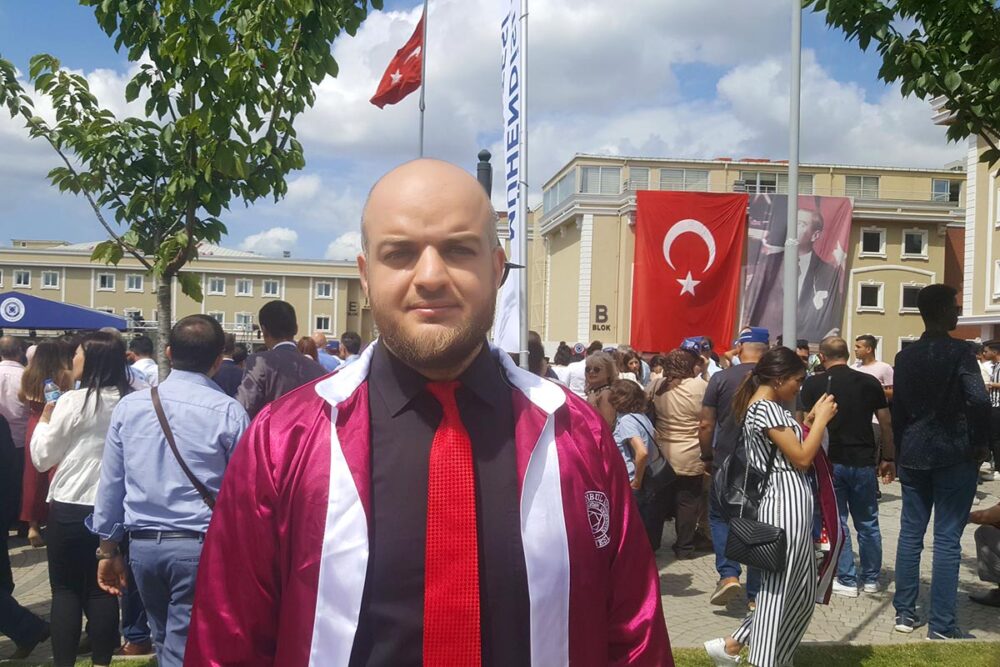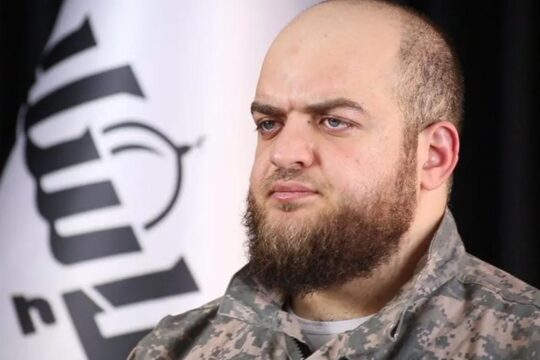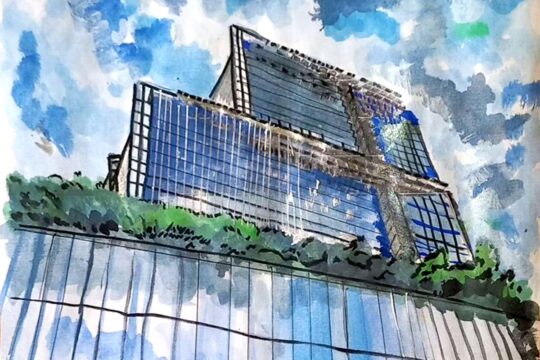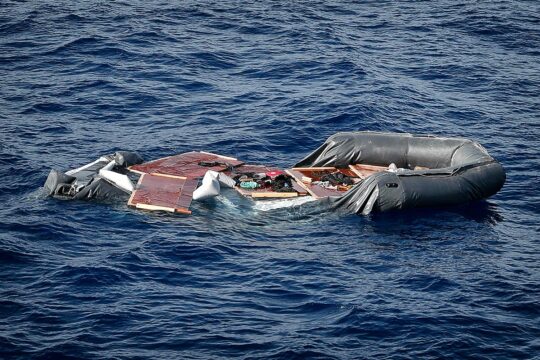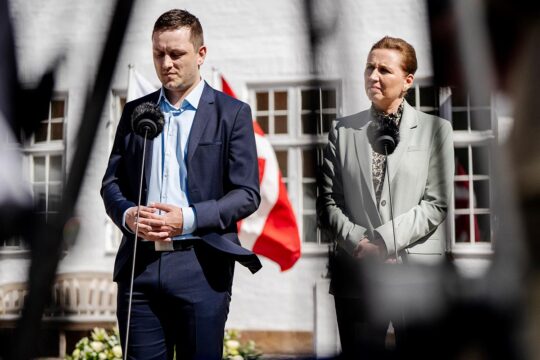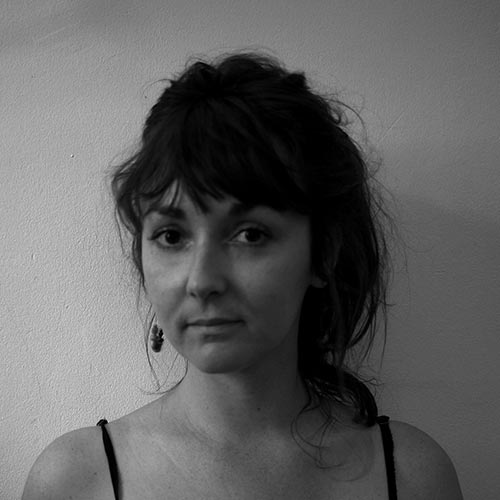He disputes everything, including the fact that he is on trial in France. What he wants is to be tried in Syria, “in front of [his] people”. Majdi Nema’s position has remained unchanged since his arrest in Marseille in 2020. At the opening of his trial on April 29, 2025, the former Jaysh al-Islam rebel group spokesman repeated before the court that he is “certain of his innocence” and is only “waiting for the courts to realize it”.
Nema is on trial until the end of May under the principle of universal jurisdiction. He is accused of complicity in war crimes between 2013 and 2016 in eastern Ghouta, southeast of the Syrian capital Damascus. The former Syrian rebel is suspected of having contributed to the recruitment of under-age boys “with a view to the group’s armed action”. He is also accused of “colluding” with the Jaysh al-Islam group “in his capacity as spokesman, intelligence officer and strategic adviser to the group’s leadership” with a view to preparing war crimes.
In recent days, Nema, alias “Islam Alloush”, has spoken in Arabic, although he has asked several times to be allowed to speak in English. This request was rejected by the presiding judge, Jean-Marc Lavergne. As the hearings unfolded Nema, who will be celebrating his 37th birthday in the dock, retraced his career: his studies, his defection from the Syrian army, how he took up a position in Jaysh al-Islam, and the role he played within the group.
A passionate student of “international relations”
Up to now, Nema has presented himself as a former rebel working with Jaysh al-Islam to fight the regime of former Syrian president Bashar al-Assad, “one of the greatest criminals of this century”, and as a student of “political science and international relations” - the reason he came to Marseille in January 2020 on a three-month university exchange. He had just completed his degree in political science in Istanbul, Turkey, which he says was partly funded by Jaysh al-Islam. At the time, he was aiming to do a master’s degree at a British university. He was clearly passionate about his studies, and says he was one of the best students at Istanbul University.
Supported by his lawyers Romain Ruiz and Raphaël Kempf, Nema insists on his interest in international humanitarian law and minority rights, including when he was a spokesman for Jaysh al-Islam.
“Raising the alarm” about Jaysh al-Islam crimes
On Monday May 12, Nema told the court he had become aware of some of the crimes of which Jaysh al-Islam is accused - at least after his official departure in 2017 - and that he had “tried to sound the alarm” about these crimes. He made this statement after the court had seen a video a video found on his computer and broadcasted in January 2017. This video shows a parade of fighters with signs and armbands indicating that they belonged to Jaysh al-Islam, proclaiming that they were on their way to Damascus. Some of the boys in military clothing look very young.
“I remember this video very well,” said Nema. “It was after I resigned.” He said he and others – unspecified -- created a “cell” to prepare “a file” on the group’s “war crimes”. According to him, this video was one of the pieces of evidence collected with a view to lodging a complaint. Nema says he tried to lodge a complaint in Turkey, but that it was “not accepted”.
The civil parties’ lawyer, Marc Bailly, wanted an explanation. A few days earlier, another video dating from July 2015 was shown in court. It showed children in a factory, busy making weapons and uniforms for Jaysh al-Islam. According to the lawyer, the footage was filmed when Nema was still spokesman. If he was involved in compiling a file on the group’s crimes, including the enlistment of minors, why didn’t he mention it when he saw this video for the first time, the lawyer wondered. Nema replied that this propaganda video had raised questions in his mind, and that one of the people in charge of the Jaysh al-Islam media section had explained to him that it was a civilian factory under contract to the group.
Nema, before the revolution and the war
Nema was born in Saudi Arabia in 1988 to Syrian parents. In 1991, the family decided to return to Syria and settled in Idlib. Nema told the psychologist and personality investigator with whom he spoke during the investigation that he had grown up in a pleasant environment and enjoyed harmonious relations with his family. He was the fifth child in a family with six children. All of them now live in exile in Turkey, Egypt or Saudi Arabia. He described his childhood as “normal”, with parents who valued education and provided him with a “favourable” economic and social environment. His father was a care assistant and building contractor. His mother, a history and geography teacher, is a graduate of Aleppo University. This was an “exceptional” achievement for a woman of her generation, said Nema.
The court dwelt on the background of his elder brother, Mohamed. Currently a surgeon, he was imprisoned for five years by the regime, between 2006 and 2011. As a medical student in Damascus, he was locked up for “undermining national sentiment” in Saydnaya prison - a prison with a notorious reputation.
On this, Nema chose to talk about the “bond” he had with his imprisoned brother and, he says, with lawyer Razan Zaitouneh, one of the “Douma Four” who were forcibly disappeared. The mention of the Syrian lawyer’s name caused Bailly to rise from his seat. He deplored the defendant’s “indignity” in mentioning such a bond while Nema’s indictment considers Jaysh al-Islam “responsible” for abducting these four human rights defenders. But Nema continued: according to him, Zaitouneh was present when his brother appeared before the Supreme State Security Court, a special court responsible for political cases. Although the detainees there “did not have the right to be defended”, he says lawyers attended the hearings and informed the families, who had to wait outside. This news was “precious” for them, says Nema, and the lawyer brought such “precious” news to his family.
Arrest and defection from the army
Nema too was arrested when he was a medical student in Damascus, because, he said, he was part of a group at university “where we discussed the regime’s policies”. In court, he testified that he was first imprisoned for “60 hours” in March 2009, followed by a “humiliating” one-month period of judicial supervision, and then imprisoned again in April, at Branch 227, which was responsible for military security. Nema says he was interrogated and tortured for nine days, before being transferred to branch 237, known as the “Palestine branch”. He claims to have suffered ill-treatment in detention for two years. But it was also during these 45 days of detention that he met Zahran Alloush, the man who in 2011 founded the Salafist rebel group Liwa al-Islam - renamed Jaysh al-Islam in 2013.
The preacher was in prison for his religious activities. In jail, the two men exchanged views and developed what Nema described as a “mutual admiration”. He expressed his esteem for the man who was, in his eyes, the most learned cleric he knew. “Zahran Alloush had no political agenda,” he added, or in any case “he had no desire to run a state”. It was a decisive meeting for the young man, less than three years before the start of the Syrian revolution.
Once released, Nema did his compulsory military service. He was trained in Homs to handle weapons, then joined a unit in Douma, eastern Ghouta. which was responsible for maintaining telecommunications equipment. He was then assigned to unit 533, responsible for telecommunications, where he worked as a sergeant.
In 2012, the Syrian revolution turned into armed conflict. In Nema’s barracks, plans for revolt and desertion were multiplying, and he recounts taking part in a plan to defect, supervised by “a colonel”. But this man was killed “by mistake” on the orders of Liwa al-Islam, which “believed him to be loyal to the regime, whereas he was preparing to join the rebellion”. The plan failed. Defections were organized in small groups and Nema managed to flee at the end of 2012. It “wasn’t easy”, he says. “We fled with our weapons, and the tanks were behind us,” he told the court. Intercepted by a first rebel group, he joined them before joining Liwa al-Islam a few days later. There he met up with his “friend” Zahran Alloush, and soon became the group’s spokesman.
Debates about his exact role within Jaysh al-Islam (formerly Liwa al-Islam) are still ongoing. On Monday, Nema admitted the “importance” of his duties as a representative of the group, as well as his awareness of media and communication’s influence in times of war. His aim was to show “a good image of Jaysh al-Islam”, he said.
A few minutes earlier, the lawyer for the civil parties questioned Nema about a possible “contradiction”. The lawyer cited statements in the court file in which he said he remained “loyal” to the group after his resignation -- while at the same time, according to him, he was preparing a complaint against Jaysh al-Islam’s war crimes. “It’s possible that there will be a contradiction, if you so decide,” Nema replied. He added that he still stands “with Jaysh al-Islam” and “with all the rebel factions”, because they are the ones who took up arms against the al-Assad regime. These factions have since rallied to the new government in Damascus.


